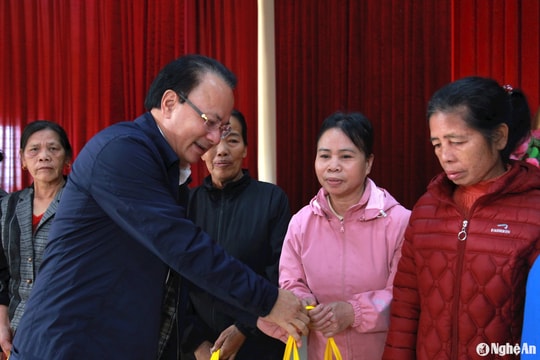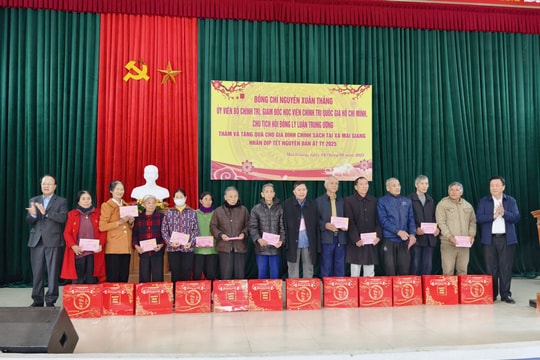"It is difficult to determine whether a Tet gift is given for personal gain if the recipient does not report it."
Delegate Pham Van Hoa emphasized this when talking about the regulation of not using budget money to organize visits, New Year greetings, and gifts for leaders.
Gifts are being abused and transformed in increasingly sophisticated ways.
Recently, Prime Minister Nguyen Xuan Phuc signed and issued Directive 34/CT-TTg on strengthening measures to ensure a joyful, healthy, safe and economical Lunar New Year 2019. In it, he emphasized that agencies in the State administrative system thoroughly grasp and strictly implement the policy of not using the budget to organize visits, New Year greetings and gift-giving for leaders of agencies and units at all levels.
In the current context, when the Party and the State are focusing on eliminating waste, corruption and embezzlement, the policy of eliminating the practice of giving gifts and New Year greetings to leaders to prevent the distortion and abuse of gifts for bribery, power and position seeking... has received the consensus and support of the people. Obviously, it is impossible to completely eliminate the negative aspects of gift giving overnight, but it is necessary to gradually reduce and improve this relationship.
According to Mr. Dinh Van Minh - Director of the Institute of Inspection Science (Government Inspectorate), giving and receiving Tet gifts has long been a fine traditional cultural feature of Vietnamese people. Giving gifts on this occasion often shows respect and gratitude to those who are close to you, who help you or between people who have business relationships with each other with pure intentions.
|
| Mr. Dinh Van Minh - Director of the Institute of Inspection Science (Government Inspectorate). |
However, what should be condemned and criticized is that gift giving has been abused and transformed in increasingly sophisticated and unpredictable ways. They take advantage of gifts to seize opportunities to bribe and flatter to get "returns" in the form of projects, power, and positions...
This situation has happened quite a lot in the past, but inspection and supervision in reality have encountered many difficulties because the gift-giving has become increasingly sophisticated.
In the past, people who gave gifts often went to the headquarters of agencies, units, and leaders' private homes, openly with "big bags", "small bags", waiting in line to "thank"... but now the form of gift giving has become more discreet. They do not give "big bags", "small bags" to be easily detected, but have more sophisticated ways of giving gifts such as envelopes, bank transfers, credit cards, luxury travel vouchers... Instead of giving directly to the boss, they choose to give to the leader's wife, children, or relatives. Therefore, if they want to denounce, it is difficult to have evidence.
In Decision No. 64/2007/QD-TTg on "Regulations on gift giving, receiving and returning of gifts by agencies, organizations and units using the State budget and by cadres, civil servants and public employees", it is clearly stated that agencies and units are only allowed to use money and assets of the State or from the State budget as gifts in cases permitted by the State regime. Agencies, units, cadres and civil servants are strictly prohibited from receiving gifts, receiving them on behalf of others or receiving them through other agencies, units and individuals. In case of receiving gifts that are not in accordance with regulations, they must be handed over to the department responsible for managing gifts of the agency for handling according to regulations.
According to the Government Inspectorate, after 10 years of implementing Decision 64, the number of officials returning gifts according to regulations is very small, only about 30 people per year, the value of the gifts is about several hundred million VND. In the recent report on the inspection and prevention of corruption in 2018 of the Government Inspectorate, it shows that 10 people returned gifts with a total value of 145 million VND.
Mr. Pham Van Hoa - Deputy Head of the National Assembly Delegation of Dong Thap province said that the giving of Tet gifts is now difficult to control and detect because the gift giver sometimes does not use budget money but uses other sources, or uses all kinds of tricks to legalize the documents to make them valid.
|
| Mr. Pham Van Hoa - Deputy Head of the National Assembly Delegation of Dong Thap province. |
“It is difficult to identify and distinguish between gifts given for personal gain, opportunism, and group interests. If the recipient does not report it, it is difficult to detect,” said Mr. Pham Van Hoa.
The leader's responsibility to set an example in receiving gifts
In order for the Party and State's directives and legal regulations on banning giving and receiving Tet gifts to leaders to truly come into life, as well as not affecting the traditional cultural beauty, Mr. Pham Van Hoa said that the propaganda against giving Tet gifts to leaders should not only be done seasonally but must be done regularly and continuously from top to bottom, aiming to change habits and thoughts, turning a beauty into a negative commercial trend. In addition, it is also necessary to stipulate the level of reward for those who denounce and catch red-handed corrupt acts of receiving gifts from officials on the basis of clear evidence.
According to Mr. Hoa, an effective solution in fighting corruption through disguised gifts is to control the assets of civil servants and public employees, especially those with positions and powers.
“The new point in the Law on Anti-Corruption (amended) which takes effect from July 1, 2019 is to expand the subjects of asset and income declaration; those who are obliged to declare must make additional declarations when there are changes in assets and income in the year with a value of 300 million VND or more. In case of detecting officials making dishonest declarations, they will be strictly handled according to current regulations. Hopefully, along with strict implementation of the declaration regulations, the assets of civil servants and public employees will be controlled,” said the National Assembly delegate.
In addition to controlling assets, the most important factor is still the example of the leader to have the influence to the subordinates. If the cadre sets an example, then set an example in all areas, not just in giving and receiving Tet gifts. If the superior is determined not to accept gifts, gradually the subordinates will not dare to give them.
“Giving gifts is simply a sentiment between close friends in communication with each other, which is completely normal. But if the gift has a selfish or flattering nature, the leader needs to clearly recognize it. Expensive gifts have other purposes and are not normal sentiments. Since there are regulations on exemplary responsibility, it is up to each person to handle it appropriately and reasonably so as not to violate the regulations,” said delegate Pham Van Hoa.
Mr. Dinh Van Minh also proposed that, in order for the regulation to be seriously implemented in practice, in addition to the determination of the entire political system, it is also necessary to promote the supervisory role of civil servants and public employees in budget spending of agencies and units, and at the same time publicize violations on mass media, avoiding coping. Along with that, gradually eliminating the mechanism of asking for titles, salaries, and projects will be the only way to eliminate the phenomenon of distorted gifts and presents during the holidays.
How to give and receive Tet gifts properly?
According to Lawyer Nguyen Minh Long - Dragon Law Company Limited - Hanoi Bar Association, Article 11 and Clause 4, Article 12 of Decision 64/2007/QD-TTg of the Prime Minister "Promulgating regulations on giving, receiving and returning gifts from agencies, organizations and units using the State budget by cadres, civil servants and public employees" then in the following cases, cadres, civil servants and public employees do not have to report to the agency or unit: "Article 11. For gifts from relatives and family members who do not have a relationship of interest related to the public service activities of the gift recipient and gifts from agencies, units and individuals not related to the public service activities of the gift recipient, cadres, civil servants and public employees who receive gifts do not have to report to the agency or unit; in cases where the law requires income declaration, cadres, civil servants and public employees must make declarations in accordance with regulations.
Clause 4, Article 12 stipulates: In addition to the cases specified in Article 11 of this Regulation, when cadres and civil servants are sick, have an accident, or on the occasion of a funeral, wedding, traditional festival or New Year, they are given a gift worth less than 500,000 VND, and the gift giving is not related to the purposes and acts specified in Article 5 of this Regulation, the gift recipient shall decide for himself/herself without having to report and must be responsible for his/her decision”./.

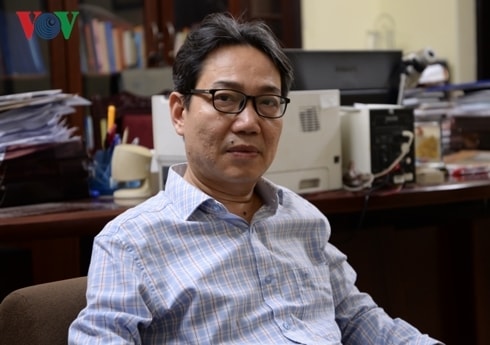
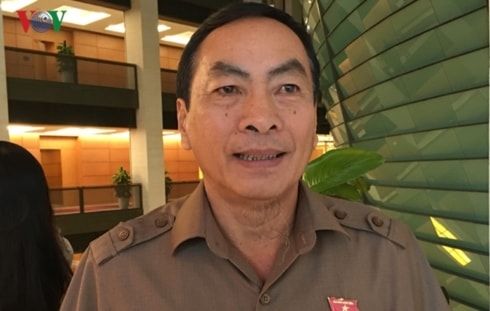
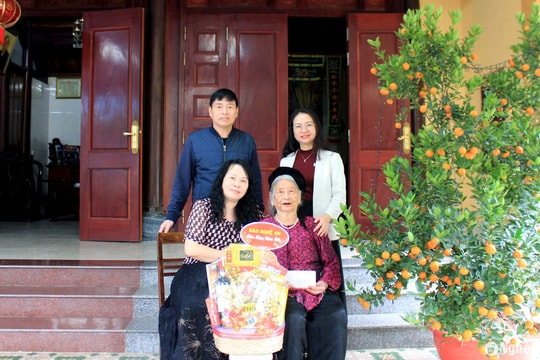
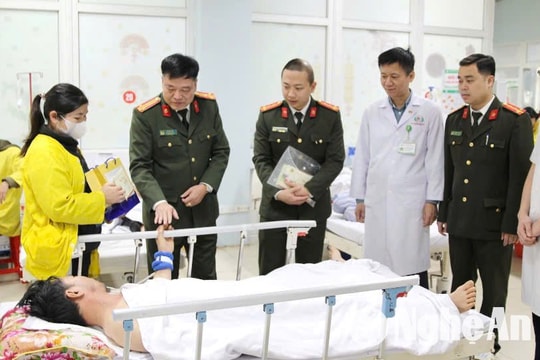

.jpg)
.jpg)
